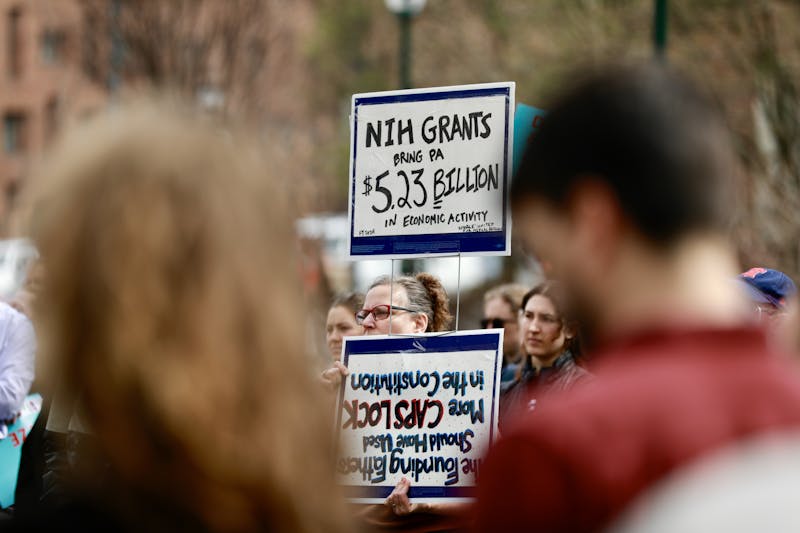Wharton freshman Jaime Ortiz was raised in a Catholic household and attended Catholic school from kindergarten through high school. She has been an altar girl since the 6th grade and was a leader in her youth group. She was active in charities and never missed Mass.
But since coming to Penn, Ortiz said her religious involvement has "significantly declined."
She said she has attended church maybe two or three times this year and completely forgot about Ash Wednesday.
Experts say that the dramatic drop in Ortiz's religious activity is not uncommon for college students. Whether it is a change in the level of involvement in students' religion or even a complete turnaround of their personal beliefs, living independently -- often for the first time -- can greatly affect religious aspects of a student's life.
University Chaplain William Gipson estimated that more than 30 percent of the undergraduate population is actively involved in at least one of the 25 religious groups on campus.
"If you were active in a religious group [in high school] ... there's a possibility that you'll keep a distance [from religious organizations at Penn]. There are others who, because they are in college, feel that it's critically important that they maintain this core part of their identity," he said.
But for Ortiz, Catholicism was not as prevalent at Penn as it was at home.
"I kind of just fell out of it, kind of like 'out of sight, out of mind,'" Ortiz said. "I fell out of a routine. ... The ritual life is what I've lost track of, but spiritually, I haven't lost any faith or anything."
Gipson said he has noticed that many students turn away from religion as freshman in an attempt to question and evaluate their beliefs and then return to their faith when they become upperclassmen.
"College creates more options for students," Hillel Director Jeremy Brochin said. "It creates more religious options, it creates more secular options and it is healthy and appropriate that people explore different kinds of ideas."
College junior Dorothy Wu grew up in a Christian family, but while she was in high school she decided that Christianity was not for her. When she came to Penn, she promised her parents she would attend church at least once. Wu ended up regaining her original faith and now attends church regularly.
"I was making my own decision," Wu said. "I know that my decision to go back to church and to give it another try wasn't mandated by my parents anymore."
Amir Memon, the president of Penn's Muslim Students Association, said he, too, feels he has become more involved in and attached to his religion since coming to Penn.
"In high school I may have done a lot of religious practices or rituals, but the same thought process wasn't there," the Wharton and College junior said. "College is a lot about being very self-reflective and really examining why you're doing things."
College freshman Sean-Tamba Matthew graduated from an all-male Catholic school. Matthew said his biggest religious transition was learning to deal with other students who have different religious ideologies.
"In high school everyone believed in the same things," Matthew said. "Now ... it's the total opposite. ... Having to actually stand up for what I believe in -- that has made me a lot stronger in my faith."
As the only Jewish student in his class in high school, College freshman Micah Kaplan said that the large Jewish community at Penn was one of the factors that influenced his decision to attend the school.
"More than being a religious experience, it's a sense of community," the Virginia native said. "Having people understand ... certain things that kids in high school didn't get ... it's very appealing."
Still, for some college students, the decision to get involved with their religious communities is not that easy.
"I think every student struggles with issues of lifestyles and values and boundaries in terms of their behavior," Brochin said. "People kind of explore their individual identity and make those choices."
College sophomore Lisa Friedman has found herself becoming more detached from her religion since coming to Penn.
"As I've gotten older, I've found that believing in religion hasn't really helped me more in my life," Friedman said. "As I've been on my own, I've decided that it's probably not going to be a major part of my life."
Despite decreased interest from segments of the student population, religion still has a distinct presence on campus, in part evidenced by the different religious awareness weeks that run frequently throughout the spring. For instance, this week is simultaneously Hinduism Awareness Week and Jesus Week, and events are held daily.
"Religion on campus is at an exciting level," said Sue Harte, acting director of the Newman Center, a Catholic hub on campus. "I think religious life at Penn is more vibrant than people think."
The Daily Pennsylvanian is an independent, student-run newspaper. Please consider making a donation to support the coverage that shapes the University. Your generosity ensures a future of strong journalism at Penn.
DonatePlease note All comments are eligible for publication in The Daily Pennsylvanian.







